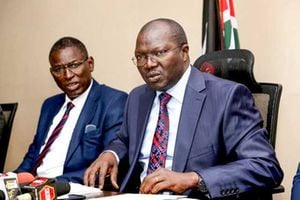My critically ill mum mistrusts me, help!

A sick woman in hospital.
Hi Eric,
My mother is critically ill, and I am the firstborn of four children; we are all adults. However, she does not want to cede control of her finances, even though the doctors say she has not got much time to live. It seems that she does not trust me because she does not want to sign over a power of attorney to me. What can I do?
Dear Reader,
Trust, or lack of it, in any relationship is congenially not a function of law. While many people never share their stories, mistrust is often a representation of bad experiences that remain untold. Your mother’s story may only be known to her, but a troubled past likely informs it.
To set this discussion straight, no amount of law, written or otherwise, could coerce anyone to trust another. Even as we seek to invite the Power of Attorney (POA) into this conversation, it is not a concept to birth nor inculcates trust. Let us remember that applying law in our transactions depicts habitual fears many hold due to a string of failed promises and commitments. This context of trust should nevertheless imbue insignificance of the issue you raise.
Why do you want power of attorney?
From the reading, it is not clear why you want power of attorney. Is your wish motivated by the inability of the four siblings to pay medical bills for their mother, who seems to be hoarding funds that are so badly needed? Is it because you strongly believe the doctor’s assessment that she has little time left? It follows, therefore, that power of attorney is a legal instrument used by individuals and entities to empower other persons to act on their behalf for defined purposes.
The general rule is that an agent under a power of attorney always acts in the name of the principal as if they were the principal. A power of attorney gives the agent authority to execute documents and decisions, besides exercise processes that may include legal and social actions just as the principal would have. However, such measures are tethered to specific instructions, boundaries and defined purposes. It is qualified as ultra vires, where one, especially an agent, acts or executes beyond their legal power or authority.
There are different forms of power of attorney namely: general, irrevocable and special. The available power of attorney gives the agent a broad scope and powers to act as the principal on health, finance and others. Special power of attorney limits an agent to specific functions, which upon actualisation, the authority terminates. It is possible to have several agents, each under specific instructions on behalf of a one principal. Irrevocable power of attorney exists by the definition of its formation. It cannot be terminated unless both the principal and the agent agree to do so. This is mainly created to represent and protect the interests of likely vulnerable groups such as minor/s, spouses, mentally ill, and relatives.
There is a duality in a power of attorney, of rights and duties shared in an oversight-compliance fashion between the principal and agent. A principal is expected to: establish and terminate power of attorney according to provisions of the Land Registration Act, carefully select a trusted agent, make the ultimate decision on particulars within a power of attorney: execute, verify and partake the process of the execution of the power of attorney: and pay stamp duty upon registration of the POA. The agent must receive specific and sometimes general irrevocable tasks from the principal; keep records of all transactions carried out on behalf of the principal, and act exclusively within the confines of duties given by the POA.
Power of attorney is considered to be legally binding if the principal and agent have appended their signatures on the document acknowledging the shared body of obligations, according to Section 44 of the Land Registration Act, both afterwards have appeared before a registrar with witnesses for the registrar to satisfy the agent’s entitlement of transacting on behalf of the principal, and if they are granted verification to execute the content of the POA by the registrar.
As a legal document, power of attorney is conceptualised to thrive on trust and fidelity to its terms. Any breach on the agent’s part that could include an assumption by the principal of poorly executed instructions may lead to revocation of their delegated authority, hence cease the acting-for position. In cases of sick persons, where they are principals, such as your mum, power of attorney only functions during their life and terminates automatically upon death.
Since death removes the instruction giver, the Law of Succession is then applied to deal with the deceased’s estate. It is clear from this conversation that your mother can only sign over a power of attorney to any of her children willingly, without undue influence, and when she is in control of her faculties. In rounding up this talk, let us quote what one anonymous writer said, “a single lie discovered is enough to create doubt in every truth expressed.”
Mr Mukoya is a lawyer with over 17 years of experience. He’s the Executive Director of the Legal Resources Foundation. Legal query?
E-mail [email protected]





